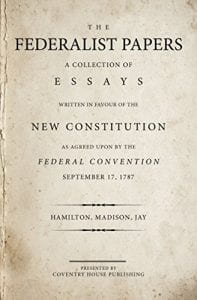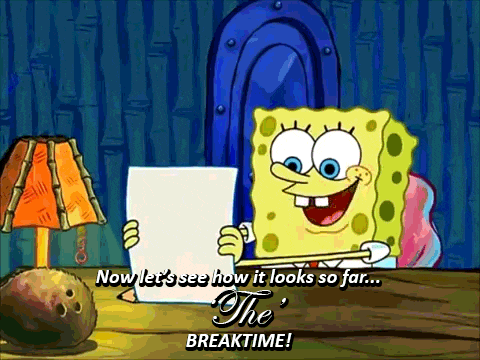There are four things, which I humbly conceive, are essential to the wellbeing[1], I may even venture to say, to the existence of the United States as an Independent Power:
1st. An indissoluble Union of the States under one Federal Head[2].
2dly. A Sacred regard to Public Justice[3].
3dly. The adoption of a proper Peace Establishment[4], and
4thly. The prevalence of that pacific and friendly Disposition, among the People of the United States, which will induce them to forget their local prejudices and policies, to make those mutual concessions which are requisite to the general prosperity, and in some instances, to sacrifice their individual advantages to the interest of the Community[5].
These are the Pillars on which the glorious Fabrick of our Independency and National Character must be supported; Liberty[6] is the Basis, and whoever would dare to sap the foundation, or overturn the Structure, under whatever specious[7] pretexts he may attempt it, will merit the bitterest execration[8], and the severest punishment which can be inflicted by his injured Country[9].
Under the first head, altho’ it may not be necessary or proper for me in this place to enter into a particular disquisition[10] of the principles of the Union, and to take up the great question which has been frequently agitated, whether it be expedient and requisite for the States to delegate a larger proportion of Power to Congress[11], or not, Yet it will be a part of my duty, and that of every true Patriot, to assert without reserve, and to insist upon the following positions, That unless the States will suffer Congress to exercise those prerogatives[12], they are undoubtedly invested with by the Constitution, every thing must very rapidly tend to Anarchy and confusion, That it is indispensable to the happiness of the individual States, that there should be lodged somewhere, a Supreme Power to regulate and govern the general concerns of the Confederated Republic[13], without which the Union cannot be of long duration. That there must be a faithfull and pointed compliance on the part of every State, with the late proposals and demands of Congress, or the most fatal consequences will ensue, That whatever measures have a tendency to dissolve the Union, or contribute to violate or lessen the Sovereign Authority, ought to be considered as hostile to the Liberty and Independency of America[14], and the Authors of them treated accordingly, and lastly, that unless we can be enabled by the concurrence[15] of the States, to participate of the fruits of the Revolution, and enjoy the essential benefits of Civil Society, under a form of Government so free and uncorrupted, so happily guarded against the danger of oppression, as has been devised and adopted by the Articles of Confederation, it will be a subject of regret, that so much blood and treasure[16] have been lavished for no purpose, that so many sufferings have been encountered without a compensation[17], and that so many sacrifices have been made in vain. Many other considerations might here be adduced[18] to prove, that without an entire conformity to the Spirit of the Union, we cannot exist as an Independent Power; it will be sufficient for my purpose to mention but one or two which seem to me of the greatest importance. It is only in our united Character as an Empire, that our Independence is acknowledged[19], that our power can be regarded, or our Credit supported[20] among Foreign Nations. The Treaties of the European Powers with the United States of America, will have no validity on a dissolution of the Union. We shall be left nearly in a state of Nature[21], or we may find by our own unhappy experience, that there is a natural and necessary progression, from the extreme of anarchy to the extreme of Tyranny[22]; and that arbitrary power is most easily established on the ruins of Liberty abused to licentiousness[23].
- The four core concepts Washington outlines in this letter are importance of a strong federal government, paying off the debt accrued by the nation during the war, establishing a well-trained militia in each state and promoting unity between the states despite their differences. Thirteen years later he would echo several of these points in his Farewell Address. There he reemphasizes the importance of balancing the nation’s budget, as well as unity in multiple forms, encouraging it between the states and discouraging the development of political factions and parties. He also praises the Constitution as an improvement on the Articles of Confederation, as it had created the strong federal government he advocated for in this letter (Washington).
- When this letter was written in 1783, the Constitution had not been adopted yet and the government system being used was the Articles of Confederation. The AoC government had no executive branch on the federal level and was instead governed by a congress of representatives from each state. The main functions of the federal government were foreign affairs and minting money, while most other matters were left up to the individual state governments (Samson).
- Although the meaning behind this statement is not immediately obvious to a modern reader, Washington late elaborates on this point, making it clear he is referring to the country’s debt. Both the federal and state governments were in substantial debt to foreign and domestic powers by the end of the war. In 1790, Alexander Hamilton would estimate that the US was $54 million in debt, with about $42 million of that being do domestic creditors (Hamilton).
- It was important to Washington that each state have a well-armed and trained militia. Washington feared that an armed rebellion could uproot the fragile new government unless there was a capable militia to prevent that. Washington’s vision of armed uprising would come to pass twice before his death, in Shays’ Rebellion (1787) and the Whiskey Rebellion (1791-1794). Shays’ Rebellion, prompted by high taxes and a bad harvest year, was successfully quashed by the Massachusetts state militia (Shays’…). The Whiskey Rebellion occurred when Pennsylvania farmers violently protested a newly implemented federal grain tax. Washington himself led an army of 13,000 troops to put down the rebellion and enforce the federal government’s right to taxation that it had recently gained after the ratification of the Constitution (“So, what…”).
- Washington’s fourth point is not so much a concrete policy suggestion as it is an appeal to the people of the United States to put aside their differences and work towards national unity. Today it is taken for granted that the United States is one cohesive nation, but that was not the case during the revolution and the survival of the early United States as an independent nation was far from guaranteed. Differences between urban and rural, north and south made merging the colonies into a unified nation a difficult task (Jaffee).
- Washington’s concept of liberty stemmed from the philosophy of John Locke, an Enlightenment Era thinker generally regarded as the “Father of Liberalism”. Locke believed that a just government could only exist with the consent of the citizens. Locke viewed society as a contract where the citizens agree to obey societal rules in exchange for the security provided by government. Unlike philosopher Thomas Hobbes, Locke believed that people willingly enter this contract and, if the government does not uphold their end, it is within the people’s rights to break the contract through revolution. Governments can fail to uphold the contract by either failing to provide stability or by infringing on the people’s “natural rights”. Locke believed that humans were endowed by God with a set of “natural rights” which are both universal and inalienable, chief among those being “life, liberty and property”. To Locke, unless a government upheld these rights for all its citizen, those citizens would have the right to overthrow that government and establish a new one (Cranston, 85).
- “Specious” Adjective: having a false look of truth, fairness or genuineness (Webster’s…, 888).
- “Execrate” Verb: A. to declare to be evil or detestable B. to detest utterly (Webster’s…, 313).
- The severest punishment a person can receive, capital punishment, has an interesting history in the United States. While in modern times the US is one of the few developed nations to still use the death penalty, its law were comparatively progressive in the colonial era. The use of capital punishment in the pre-revolution colonies and the Articles of Confederation U.S. was largely based on British practices of the time. Leading up to the American Revolution, Britain was steadily increasing the number of crimes that could warrant execution, eventually peaking with 220 different capital crimes. After independence, the laws regarding capital and corporal punishment were not uniform across the states and they have not been since. By 1800 majority of northern states had reduced the number of capital crimes to less than five. On the other hand, many southern states had increased their list of capital crimes, adding many that only pertained to slaves. The mid-19th century saw a thriving death penalty abolitionist movement push for significant reforms and even abolition of the death penalty in some states (Reggio).
- “Disquisition” Noun: a formal inquiry or discussion (Webster’s…, 260).
- The issues of state’s rights and the balance between federal and state power have been present throughout American history. Jefferson Davis, president of the Confederate States of America, used “state’s rights” as an explanation for the South’s secession and the fundamental motivation of Confederate soldiers. Davis held strong to the claim that the Civil War was not motivated by slavery, but by the North and the Federal Government exerting unfair control over the South (Davis). In modern times “state’s rights” arguments have figured prominently in issues as diverse as marijuana legalization and LGBT discrimination laws.
- “Prerogative” Noun: A. a special privilege or advantage B. a right attached to an office, rank or status (Webster’s…, 713).
- Prior to the adoption of the Constitution, the US was considered a confederation of states. A confederation is a union of independent nations or states, all of which have an inherent right to secede from the confederation. This differs from a federation, which is a union of only partially independent states under a weak federal power (“Confederation”). Defining the US as a confederation rather than a federation emphasizes just how little power the federal government held under the Articles of Confederation, although in a pure confederacy there would be no federal government. Principally, the United States was a group of sovereign states voluntarily united for the purpose of achieving a common goal (Batts). There are many historical examples of confederation governments including multiple examples in the pre-colonial Americas (one notable example being the Iroquois) and the Confederacy formed of secessionist states during the Civil War, at least in name. Due to their inherent instability, true confederations are very rare. The closest modern analogue to the Articles of Confederation system is probably the European Union, although it straddles the line between federation and confederation but is not legally classified as either (“Confederation”).
- Here Washington describes any action taken to separate states from the Union or lessen the power of federal sovereignty as hostile to the U.S. itself because, as he has said earlier in this letter, it is essential to the survival of the nation that the states remains unified. Significant conflict between the states or further weakening of the federal government could have spelled the doom of the young nation.
- “Concurrence” Noun: A. agreement in action, opinion or intent B. a coming together (Webster’s…, 185).
- Blood and treasure here refer to the casualties and financial costs of the war, respectively. Throughout the war approximately 4,500 servicemembers were killed and 6,200 were nonfatally wounded, for a total of 10,700 casualties. Casualties made up just under 5% of U.S. servicemembers by the war’s end (US Department…). The financial cost of the war was also significant,
- The word compensation is used very intentionally here. Only three months prior to this letter’s distribution Washington’s officers had raised a petition to mutiny due to inadequate compensation. The officers had not been paid during the war and Congress still had not paid them those wages or given them the pensions they were owed. Washington spoke to these officers in his Newburgh Address where he sympathized with their plight and pledged to help them, but denounced their intentions to mutiny (“Newburgh…”)
- “Adduced” Verb: to offer as example, reason, or proof in discussion or analysis (Webster’s…, 12)
- At the time this letter was written, only a handful of countries acknowledged the United States as an independent nation rather than as a British colony in revolt. Ostensibly the first country to acknowledge the United States’ independence from Great Britain Morocco. However, this recognition was in name only and was not formalized until 1786 when a treaty of peace was signed between the two nations (Dolan). So, the first country to officially acknowledge the United States as an independent nation was France in 1778. Although this treaty was established under the French monarchy, it was maintained after the French Revolution. Additionally, the United States had been recognized by The Netherlands, Spain and Sweden (“Countries”).
- Due to the federal governments inability to tax under the Articles of Confederation, its only recourse to address the national debt was to print money. However, with nothing backing it, the Continental Dollar collapsed, leaving the federal government to borrow money domestically to pay off its foreign debt. This situation was greatly improved after the adoption of the Constitution which allowed the federal government to tax and impose tariffs. The national debt was greatly decreased during Hamilton’s term as Secretary of the Treasury and continued to decrease until the War of 1812 (Phillips).
- This is a direct reference to the “State of Nature”, a concept developed by Thomas Hobbes in his 1651 book Leviathan. Hobbes describes it as the natural condition of mankind, where there is no government or civilization. Humans living in the State of Nature are constantly in conflict with each other in pursuit of power and resources. With no greater power to control them, mankind would exist in a perpetual state of war. Hobbes believed that life in that state is “nasty, brutish and short”. In Leviathan, Hobbes posits that government arises out of human desire to escape the brutality of the State of Nature (Merriam, 154).
- This is an example of the cyclical theory of history and periodic revolution. This concept was popular among the American Revolutionaries, many of whom believed that it was important for a society to go through periods of revolution. Thomas Jefferson wrote that “the tree of liberty must be refreshed from time to time with the blood of patriots & tyrants. it is it’s [sic] natural manure” (Jefferson). The cyclical theory posits that corruption and unjust governments are inevitable and when they arise the people with inevitably revolt. The new government established by the revolutionaries will inherently have flaws, leading to corruption and injustice and eventually, another overthrow of power (Lienesch).
- “Licentious” Adjective: loose and lawless in behavior; esp : lewd, lascivious (Webster’s…, 516)
Citations:
- BATTS, ROBERT LYNN. “THE NEW CONSTITUTION OF THE UNITED STATES.” American Bar Association Journal, vol. 5, no. 4, 1919, pp. 584–601. JSTOR, JSTOR, jstor.org/stable/25700621.
- “Confederation.” Wikipedia, Wikimedia Foundation, 19 June 2018, en.wikipedia.org/wiki/Confederation.
- “Countries.” U.S. Department of State, U.S. Department of State, history.state.gov/countries.
- Cranston, Maurice. “Locke and Liberty.” The Wilson Quarterly (1976-), vol. 10, no. 5, 1986, pp. 82–93. JSTOR, JSTOR, jstor.org/stable/40257094.
- Davis, Jefferson. “The Doctrine of State Rights.” The North American Review, vol. 150, no. 399, 1890, pp. 205–219. JSTOR, JSTOR, www.jstor.org/stable/25101937.
- Dolan, Kerry A. “Why Morocco Matters To The U.S.” Forbes, Forbes Magazine, 21 Nov. 2013, forbes.com/sites/kerryadolan/2013/11/21/why-morocco-matters-to-the-u-s/#635e4fe14f75.
- Hamilton, Alexander. “Founders Online: Report Relative to a Provision for the Support of Public Credi …” National Archives and Records Administration, National Archives and Records Administration, founders.archives.gov/documents/Hamilton/01-06-02-0076-0002-0001.
- Jaffee, David. “Religion and Culture in North America, 1600–1700.” The Metropolitan Museum of Art, I.e. The Met Museum, Oct. 2004, www.metmuseum.org/toah/hd/recu/hd_recu.htm.
- Jefferson, Thomas. “Thomas Jefferson to William Smith.” Library of Congress, loc.gov/exhibits/jefferson/105.html.
- Lienesch, Michael. “Historical Theory and Political Reform: Two Perspectives on Confederation Politics.” The Review of Politics, vol. 45, no. 1, 1983, pp. 94–115. JSTOR, JSTOR, www.jstor.org/stable/1407276.
- Merriam, Charles Edward. “Hobbes’s Doctrine of the State of Nature.” Proceedings of the American Political Science Association, vol. 3, 1906, pp. 151–157. JSTOR, JSTOR, jstor.org/stable/3038543.
- “Newburgh Address: George Washington to Officers of the Army, March 15, 1783.” George Washington’s Mount Vernon, mountvernon.org/education/primary-sources-2/article/newburgh-address-george-washington-to-officers-of-the-army-march-15-1783/.
- Phillips, Matt. “The Long Story of U.S. Debt, From 1790 to 2011, in 1 Little Chart.” The Atlantic, Atlantic Media Company, 14 Nov. 2012, theatlantic.com/business/archive/2012/11/the-long-story-of-us-debt-from-1790-to-2011-in-1-little-chart/265185/.
- Reggio, Michael H. “History of the Death Penalty.” PBS, Public Broadcasting Service, pbs.org/wgbh/pages/frontline/shows/execution/readings/history.html.
- Samson, Steven Alan, “Articles of Confederation” (1990). Faculty Publications and Presentations. 256.http://digitalcommons.liberty.edu/gov_fac_pubs/256
- “Shays’ Rebellion.” History.com, A&E Television Networks, 2009, history.com/topics/shays-rebellion.
- “So, What Was the Whiskey Rebellion, Anyway?” George Washington’s Mount Vernon, mountvernon.org/george-washington/biography/washington-stories/what-exactly-was-the-whiskey-rebellion/.
- US Department of Veterans Affairs. “America’s Wars.” Office of Public Affairs, May 2017.
- Washington, George. “Avalon Project – Washington’s Farewell Address 1796.” Avalon Project – Documents in Law, History and Diplomacy, http://avalon.law.yale.edu/18th_century/washing.asp.
- Webster’s School Dictionary. Merriam-Webster Inc.,Publishers, 1986.






